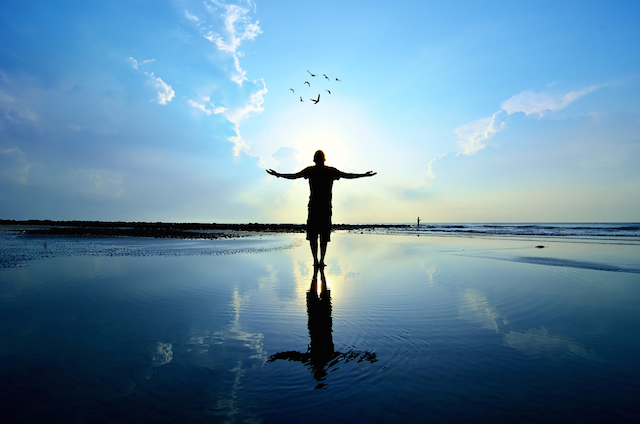
“When we are mindful, deeply in touch with the present moment, our understanding of what is going on deepens, and we begin to be filled with acceptance, joy, peace, and love.” ~Thich Nhat Hanh
In January, what I desire most is to slow down.
My heart wants to use the New Year as a time to reflect on the year that has passed by—what felt right, what didn’t feel right, and areas of potential growth. And my mind wants to use the New Year as an opportunity to look ahead and discover the ways in which I can improve myself moving forward, based on insights that I gained looking back.
In the past, many of my New Year’s resolutions involved behavioral changes that I knew would be beneficial—eating better, exercising more, writing more, waking up earlier. But I often found myself in a mental tug of war with my resolutions.
I struggled with the future mindset that inevitably comes with setting goals. I found myself striving, wanting, sometimes forcing—the very opposite of mindfulness.
I haven’t quite found the delicate balance of accepting myself and my present moment while simultaneously working toward future goals.
How do I accept myself and the present moment as is if I am in a mindset of wanting different for myself? How do I find the balance between tuning into my body and heart and meeting ever-changing needs, and staying consistent with the behaviors I have determined I need to bring into my life?
I am sure there is an evolved state where self-acceptance and self-improvement can live harmoniously, but I have not yet discovered this state of balance. And that is okay. We are all a work in progress, discovering and starting over every day.
So this year, I am choosing differently for myself. Instead of a slew of resolutions, I am setting an intention. My intention is to live consciously and compassionately in each moment, whatever that moment may bring.
This means listening deeply to myself.
This means:
- Resting if I am tired.
- Moving when my body needs to move.
- Nourishing myself when I am hungry.
- Stopping when I am full.
- Silencing my inner critic.
- Acting with kindness, toward myself and others.
And the list could go on and on.
We may not always be able to meet our needs immediately as they arise, but we can still tune into the messages that our body, mind, and spirit send to us, and honor those. This is the blessing of self-care.
Cultivating compassionate awareness and making choices accordingly feels so much more freeing than a resolution or a goal. I am free to call forth whatever feels right.
And most importantly, from this place of consciousness, we can meet each other with true kindness. We can connect with strangers and loved ones with an open heart. We can allow generosity and patience.
We can be with the people and experiences of our lives in a meaningful, present manner.
But how do we learn how to listen to ourselves in this way? We are so used to staying in our heads and our thoughts, disconnected from the soul of our internal and external experiences. Here are some possible ways to connect with ourselves more deeply in the new year.
Not all of these tools might be for you, or maybe you might discover your own. Each of us has to walk our path in the way that feels most comfortable.
1. Slow down.
For some, this can feel terrifying! We are used to maintaining a rushed pace, often to distract ourselves or for fear of missing out. Play close attention to when you are moving too fast, or are too busy.
Consider asking yourself whether there is something you are avoiding in your busyness. Say “No” to activities that aren’t necessary or meaningful to you. Choose consciously to block out time on your schedule for rest.
Create buffers between activities so you are not rushing, and allow yourself time to transition.
2. Discover quiet.
The constant noises of our world—people talking, music playing, kids asking, technology beeping—can be loud and intrusive. The voices in our heads—our constant commentary—can be deafening. Turn the volume down, or better yet, switch to silent mode, and allow yourself to just be.
This is when you can start to become aware of the forces that operate within you. This is when you can feel the beating of your heart, or the sensation of your breath. This is when you can feel how emotions, desires, and aversions come and go like the tide of the ocean waves.
3. Experiment with meditation.
Once you feel comfortable with disconnecting, experiment with how meditation feels. Meditation is a way to observe all of yourself in an intimate way. You might start with a brief sitting practice where you focus on the sensation of breathing for a few minutes.
Don’t put pressure on yourself to meditate in a certain way. Don’t make it another project or goal that you can fail at. Meditation is called a practice for a reason. Find your entry point and build from there.
4. Allow self-compassion.
Being with yourself won’t be very fun if you are always criticizing yourself. Make a pact to only use kind, loving words with yourself, the way you would with a child or a favorite friend. Compassion for yourself improves well-being, and is the foundation from which compassion for others can grow.
5. Live mindfully.
Practice immersing yourself in your experiences, in a curious, non-judgmental manner. There are several ways to experiment with mindfulness in your life. Try using all of your senses to consciously connect to a mundane experience.
For example, while washing the dishes, really listen to the sound of the water, feel the slippery soapiness of the dishes, inhale the scent of dish soap. Using our senses to deepen our experience prevents us from ruminating about an argument with our boss or worrying about tomorrow’s crazy schedule.
Alternatively, if you find yourself waiting, allow yourself to just wait. Put your device of choice away and focus on your breath, or the sensory experience of being where you are. This moment is the only moment that truly exists. Mindfulness allows us to truly live that moment, deeply and intentionally.
Man with raised arms image via Shutterstock
About Monisha Vasa
Dr. Monisha Vasa is a board certified General and Addiction Psychiatrist in Newport Beach, California. She recently published her first children's book, "My Dearest One." She is also a mother of two young children, and a student of yoga and meditation. You can learn more about Monisha at mindful-healing.com.


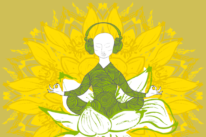
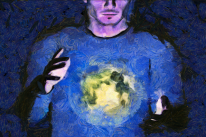
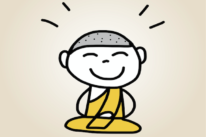


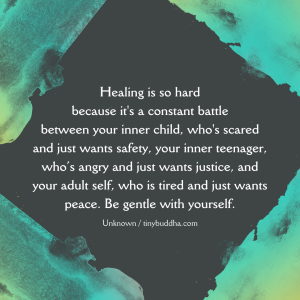
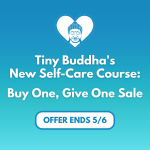




 Though I run this site, it is not mine. It's ours. It's not about me. It's about us. Your stories and your wisdom are just as meaningful as mine.
Though I run this site, it is not mine. It's ours. It's not about me. It's about us. Your stories and your wisdom are just as meaningful as mine. 